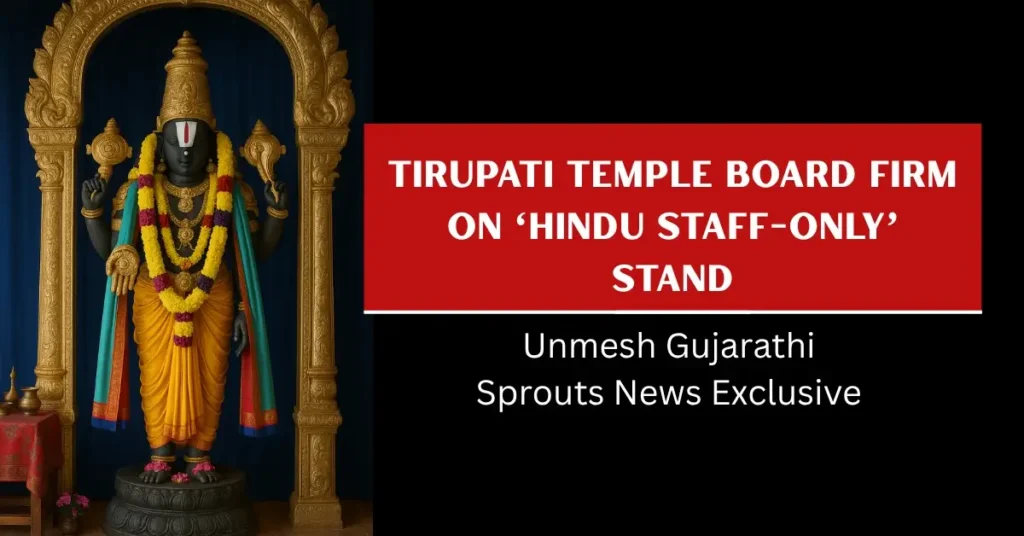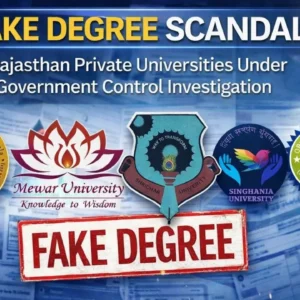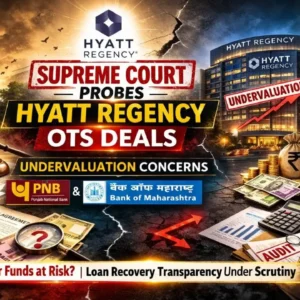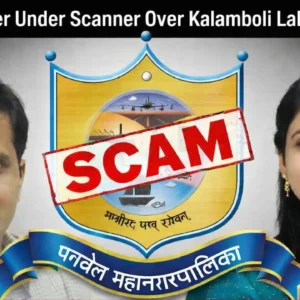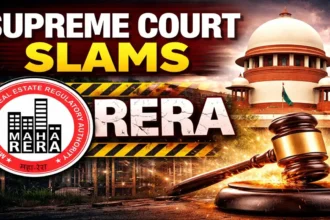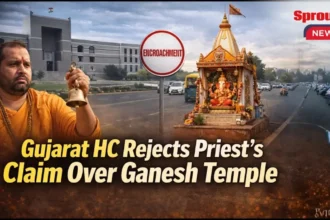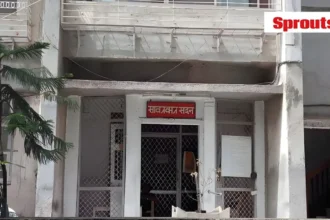Tirupati Temple Board Firm on ‘Hindu Staff-Only’ Stand
• TTD Suspends Senior Official Over Christian Faith
• Vigilance Probe Leads to TTD Suspension
• Religious Compliance Sparks Controversy
Unmesh Gujarathi
Sprouts News Exclusive
Contact: +91 9322755098
The Tirumala Tirupati Devasthanams (TTD) has suspended senior officer A. Rajasekhar Babu for allegedly violating its Hindu-only employment policy by attending Christian church services. The action follows a vigilance probe and aligns with Andhra CM Chandrababu Naidu’s stance on restricting temple jobs to Hindus. The move has sparked legal, ethical, and political debates over religious staffing norms.
The Tirumala Tirupati Devasthanams (TTD), custodian of the sacred Lord Venkateswara temple in Andhra Pradesh, has suspended a senior officer for allegedly violating the religious declaration signed during appointment. The move reignites the debate on religious staff policies within temple-administered institutions.
The suspended officer, A. Rajasekhar Babu, was serving as Assistant Executive Officer and General Manager of the Auctions Department. TTD’s Vigilance Department found that Babu regularly attends Christian prayers at a local church in his hometown, Puttur, despite previously declaring allegiance to Hinduism as required for employment in religiously sensitive roles.
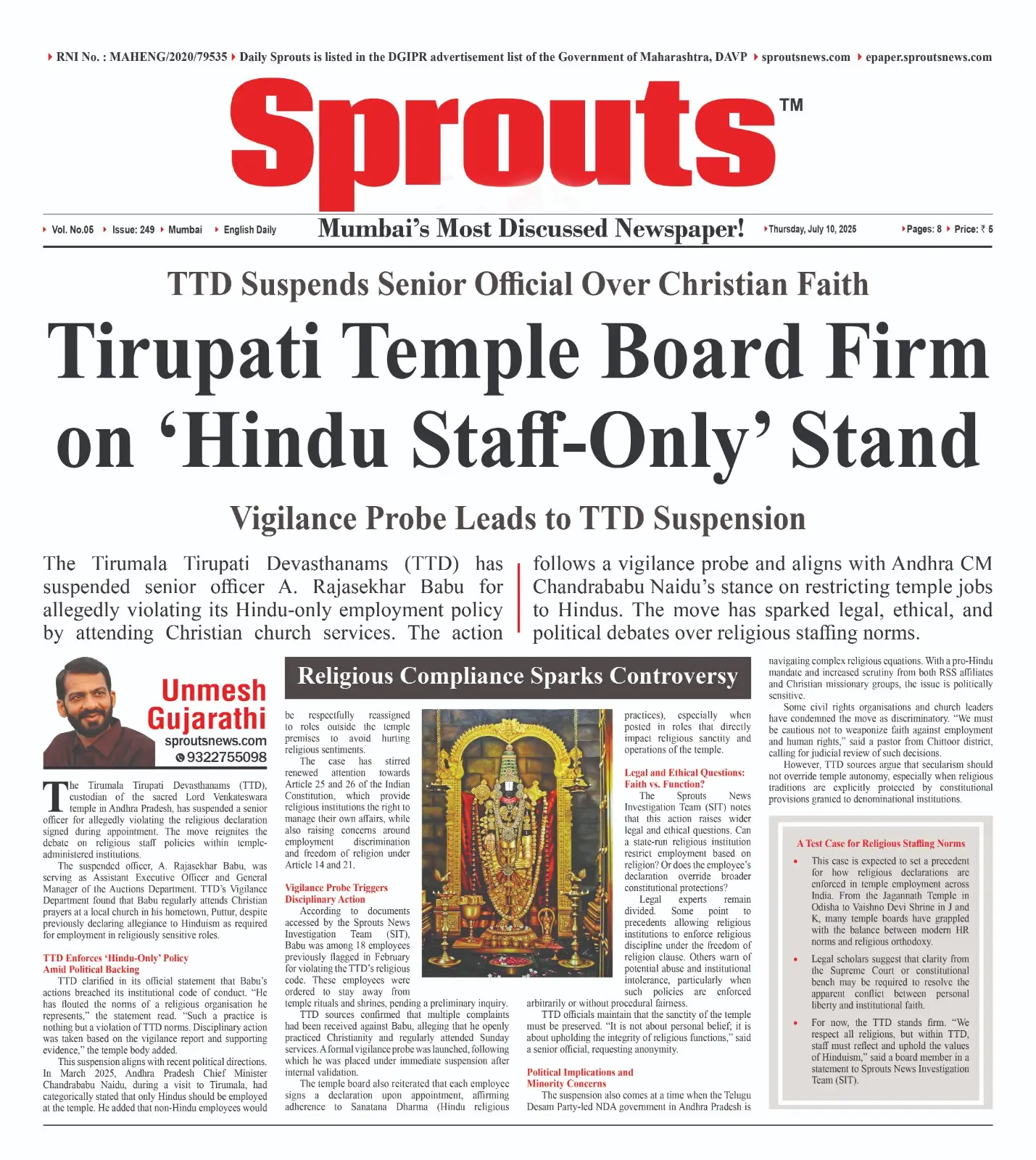
Click Here To Download the News Attachment
Tirupati Temple Board (TTD) Enforces ‘Hindu-Only’ Policy Amid Political Backing
TTD clarified in its official statement that Babu’s actions breached its institutional code of conduct. “He has flouted the norms of a religious organisation he represents,” the statement read. “Such a practice is nothing but a violation of TTD norms. Disciplinary action was taken based on the vigilance report and supporting evidence,” the temple body added.
This suspension aligns with recent political directions. In March 2025, Andhra Pradesh Chief Minister Chandrababu Naidu, during a visit to Tirumala, had categorically stated that only Hindus should be employed at the temple. He added that non-Hindu employees would be respectfully reassigned to roles outside the temple premises to avoid hurting religious sentiments.
The case has stirred renewed attention towards Article 25 and 26 of the Indian Constitution, which provide religious institutions the right to manage their own affairs, while also raising concerns around employment discrimination and freedom of religion under Article 14 and 21.
Vigilance Probe Triggers Disciplinary Action
According to documents accessed by the Sprouts News Investigation Team (SIT), Babu was among 18 employees previously flagged in February for violating the TTD’s religious code. These employees were ordered to stay away from temple rituals and shrines, pending a preliminary inquiry.
TTD sources confirmed that multiple complaints had been received against Babu, alleging that he openly practiced Christianity and regularly attended Sunday services. A formal vigilance probe was launched, following which he was placed under immediate suspension after internal validation.
The temple board also reiterated that each employee signs a declaration upon appointment, affirming adherence to Sanatana Dharma (Hindu religious practices), especially when posted in roles that directly impact religious sanctity and operations of the temple.
Legal and Ethical Questions: Faith vs. Function?
The Sprouts News Investigation Team (SIT) notes that this action raises wider legal and ethical questions. Can a state-run religious institution restrict employment based on religion? Or does the employee’s declaration override broader constitutional protections?
Legal experts remain divided. Some point to precedents allowing religious institutions to enforce religious discipline under the freedom of religion clause. Others warn of potential abuse and institutional intolerance, particularly when such policies are enforced arbitrarily or without procedural fairness.
TTD officials maintain that the sanctity of the temple must be preserved. “It is not about personal belief; it is about upholding the integrity of religious functions,” said a senior official, requesting anonymity.
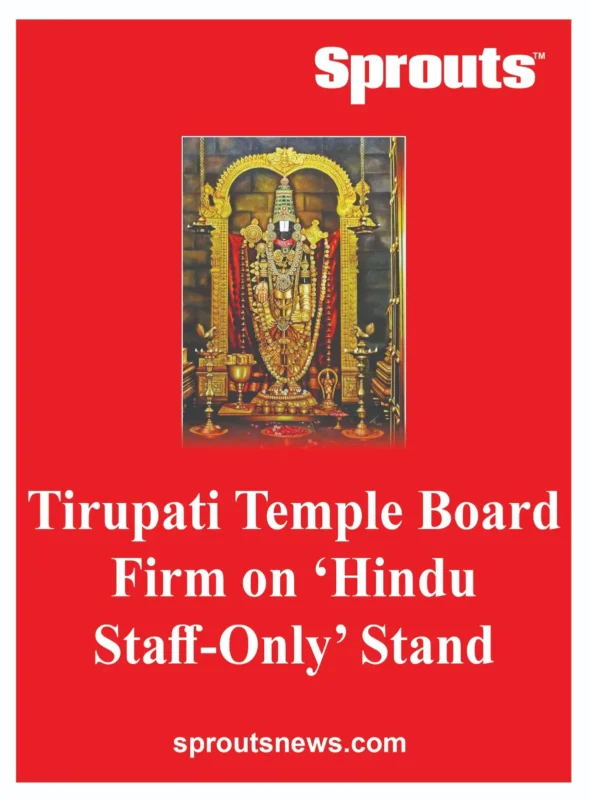
Tirupati Temple – Political Implications and Minority Concerns
The suspension also comes at a time when the Telugu Desam Party-led NDA government in Andhra Pradesh is navigating complex religious equations. With a pro-Hindu mandate and increased scrutiny from both RSS affiliates and Christian missionary groups, the issue is politically sensitive.
Some civil rights organisations and church leaders have condemned the move as discriminatory. “We must be cautious not to weaponize faith against employment and human rights,” said a pastor from Chittoor district, calling for judicial review of such decisions.
However, TTD sources argue that secularism should not override temple autonomy, especially when religious traditions are explicitly protected by constitutional provisions granted to denominational institutions.
Also Read: Runwal’s Central Park Faces Legal Fire Over ULC & Worker Dues.
Tirupati Temple Board: A Test Case for Religious Staffing Norms
This case is expected to set a precedent for how religious declarations are enforced in temple employment across India. From the Jagannath Temple in Odisha to Vaishno Devi Shrine in J and K, many temple boards have grappled with the balance between modern HR norms and religious orthodoxy.
Legal scholars suggest that clarity from the Supreme Court or constitutional bench may be required to resolve the apparent conflict between personal liberty and institutional faith.
For now, the TTD stands firm. “We respect all religions, but within TTD, staff must reflect and uphold the values of Hinduism,” said a board member in a statement to Sprouts News Investigation Team (SIT).


